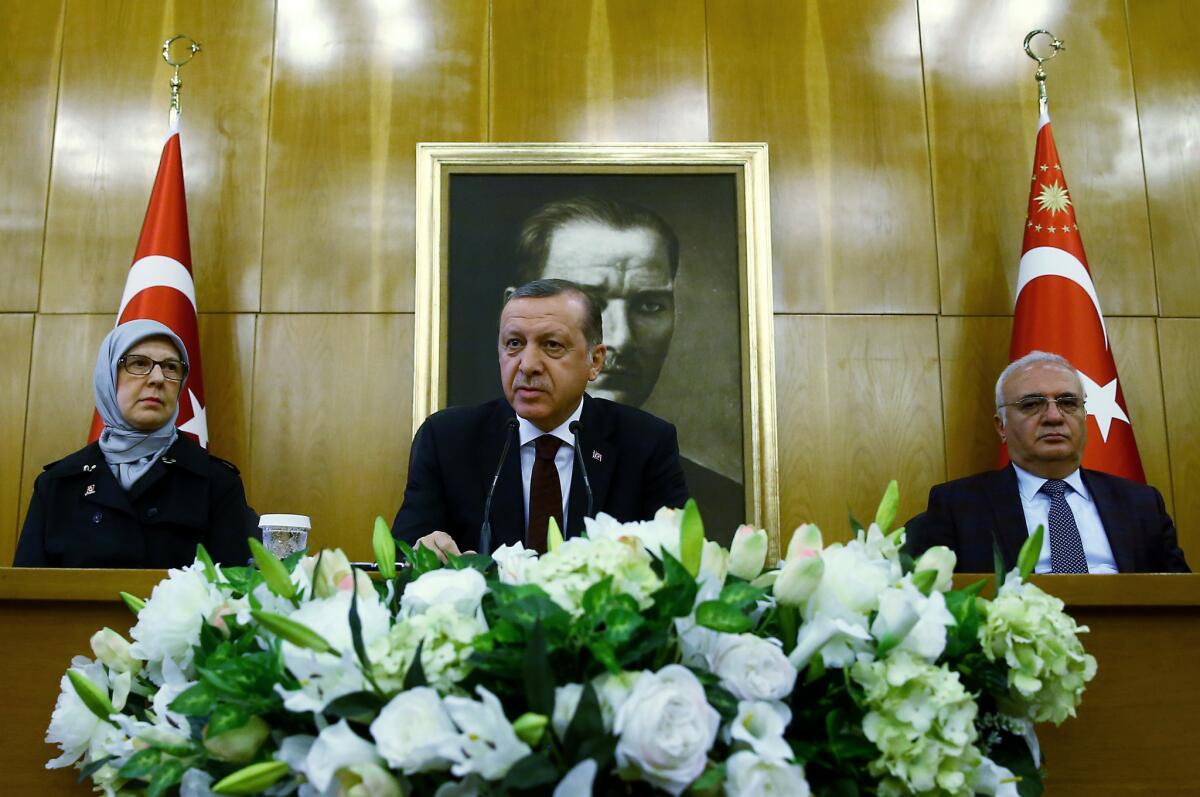How Turkey’s president went from Washington darling to ‘toxic asset’

Diplomats say Turkish President Recep Tayyip Erdogan’s (center) increasingly aggressive and undemocratic behavior in Turkey, plus what they describe as his mercurial role in the conflict in neighboring Syria, have diminished his standing in the Obama administration.
Turkey and its president, Recep Tayyip Erdogan, once were the darlings of Washington, the cherished ally and a strategic barrier between Europe and the turmoil in the Middle East.
But diplomats say Erdogan’s increasingly aggressive and undemocratic behavior in Turkey, plus what they describe as his mercurial role in the conflict in neighboring Syria, have diminished his standing in the Obama administration.
Unlike several other global leaders arriving in Washington on Thursday for the two-day Nuclear Security Summit, Erdogan has not been invited for a private sit-down with President Obama, something many here view as a major diplomatic snub.
See more of our top stories on Facebook >>
The White House sought to downplay the appearance of a cold shoulder, with spokesman Josh Earnest saying it was possible Erdogan and Obama would have an informal chat “at some point” during his visit.
U.S. officials cannot write Turkey’s leader off entirely because of Turkey’s strategic importance, its willingness to house U.S. military bases and the challenge it poses to Russian air power.
But there has been little doubt about Washington’s displeasure with Erdogan.
Erdogan “is a toxic asset,” former Turkish opposition lawmaker Aykan Erdemir said in an interview Wednesday.
“Heads of state don’t want to be in the same photo with him … but people have to deal with him,” said Erdemir, now a fellow at the nonpartisan Foundation for Defense of Democracies in Washington.
Turkey for a century was a Muslim but secular country and became a member of the North Atlantic Treaty Organization military alliance. Under Erdogan and the Justice and Development Party that supports him, Turkey has been pushed into a more religious sphere, and one where political criticism is barely tolerated.
Yet Erdogan has also positioned himself, thanks to geography, as a crucial ally. As the gateway to Europe from the Middle East, Turkey has taken in millions of refugees, mostly from Syria and Iraq, has agreed to prevent them from trying to enter Europe, and is not hesitant to use that in negotiations as a trump card.
The Turkish government this month raided the offices of the largest-circulation opposition newspaper, Zaman. It imposed a new, pro-government editorial line; banned coverage of recent terrorist bombings in Ankara, Istanbul and elsewhere; and insisted on secret trials for two journalists who reported on government shipments to Syrian rebels.
When Turkey’s Supreme Court ruled that the journalists could not be tried in secret, Erdogan announced he no longer recognized the court’s authority.
Under Erdogan, Turkey was slow to join the West’s fight against Islamic State, in part because it saw its greater enemy as Kurdish forces who are bitterly opposed to the government in Ankara but are among the strongest combatants against the Sunni militants.
Turkey long wanted the Obama administration to back a no-fly zone in northern Syria that would protect refugees from Syrian government attacks while keeping them on the Syrian side of the border.
The White House has said no. It doesn’t want to be drawn into a potential air war with Russia, which backs Syrian President Bashar Assad, and doesn’t want to commit U.S. ground troops to protect such a haven.
Citing unspecified security concerns, the U.S. government this week ordered the departure of hundreds of dependents of U.S. service members stationed at Incirlik Air Base in Turkey, about 100 miles from Syria and home to the U.S. 39th Air Base Wing. Incirlik is a crucial staging ground for U.S. air raids against Islamic State in Syria and Iraq.
However the Obama administration treats Erdogan this week, it will continue to deal with him.
“It’s the real estate factor,” said Amberin Zaman, a Turkish journalist who is now a public policy fellow at the nonpartisan Wilson Center in Washington. “No matter how many forward-operating bases you set up [in Syria], it won’t match up against Incirlik.”
ALSO
How this U.S. attorney became a social media celebrity in Turkey
Iran’s supreme leader pushes talks and missiles, not one or the other
Egyptians are hopping mad that soccer star Lionel Messi donated his shoes to charity
More to Read
Start your day right
Sign up for Essential California for news, features and recommendations from the L.A. Times and beyond in your inbox six days a week.
You may occasionally receive promotional content from the Los Angeles Times.







